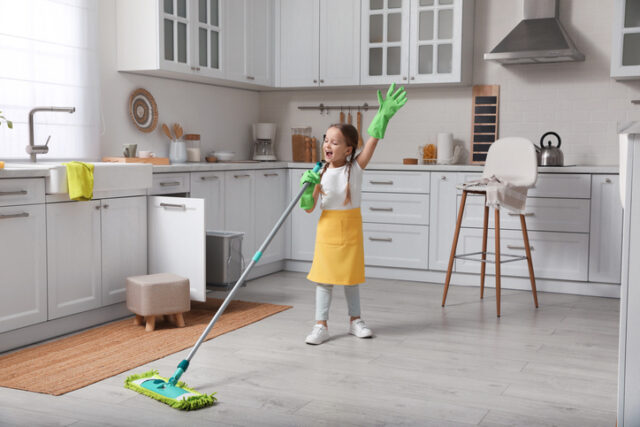Everyone remembers those rules from their parents that made them roll their eyes.

“Why on earth do I have to do that?!” you’d think. Your friends probably didn’t have to live by the same rules, and they didn’t make any sense to you at the time. However, oddly enough, those seemingly ridiculous rules probably shaped you into a better person. Here are 15 of them — and why they weren’t as absurd as you thought.
1. No dessert until you finished your vegetables.

At the time, this rule felt like the ultimate punishment. Why should a pile of limp broccoli stand between you and a bowl of ice cream? But in hindsight, it taught you the importance of balance and nutrition. You learned that good things often come after a bit of effort, and now you probably sneak some greens onto your plate without thinking twice. Plus, it’s a handy way to guilt yourself into eating healthier even as an adult.
2. You had a strict bedtime, no exceptions.

“But everyone else gets to stay up!” This rule felt like your parents were crushing your freedom. Yet, getting enough sleep taught you about self-care, consistency, and the power of rest. These days, when you’re dragging yourself to bed after a long day, you might even wish someone would tuck you in at 9 PM. And let’s face it, your mood and productivity are still better when you get a good night’s sleep.
3. No TV or video games until homework was done.
 Source: Unsplash
Source: Unsplash Back then, this rule felt like torture, especially when all you wanted was to chill after school. But it taught you to prioritise responsibilities over instant gratification. Now, whether it’s finishing work tasks or house chores, you know the satisfaction of relaxing guilt-free afterwards. You probably also learned some self-discipline, which is pretty useful when deadlines loom.
4. You had to write thank-you notes for gifts.

Receiving a gift was fun; writing a thank-you note? Not so much. You might have grumbled about this rule, but it instilled gratitude and politeness. Today, a simple “thank you” email or message can go a long way in your personal and professional life. Showing appreciation never goes out of style, and this habit makes you stand out in a world where many forget to do it.
5. No elbows on the table during meals.

This rule seemed fussy and pointless, but it wasn’t just about table manners — it was about consideration and respect. Practising good etiquette during family dinners helped you develop awareness of how your actions affect other people. Now, whether you’re at a fancy dinner or a work lunch, you can confidently navigate social situations without worrying about looking out of place.
6. You couldn’t leave the table until everyone was finished eating.

As a kid, this rule seemed like a never-ending wait. Why couldn’t you just leave after inhaling your food? But it taught you patience and respect for shared experiences. It also reinforced the idea that mealtimes were for connection, not just consumption. These days, staying present during meals might help you build stronger relationships and savour your food a bit more.
7. You weren’t allowed to interrupt adults.

This one was especially hard when you had something *really* important to say. But learning to wait your turn in conversations taught you respect and listening skills. Now, you probably notice how rare it is to find someone who truly listens without jumping in. It’s a skill that sets you apart in both your social and professional circles.
8. Chores had to be done before playtime.

Vacuuming, washing dishes, tidying your room — none of these were on your fun list as a kid. But this rule instilled a work-before-play mindset that serves you well today. You know how to manage your time and enjoy your downtime without that nagging feeling of unfinished tasks. Plus, it taught you that sometimes you just have to get things done, whether you feel like it or not.
9. You had to finish a book before starting a new one.

This rule felt stifling when you were itching to dive into a new adventure. But it taught you the value of commitment and seeing things through. Now, whether it’s projects, hobbies, or goals, you’re more likely to finish what you start. There’s something satisfying about completing things, and this rule gave you that early boost of discipline.
10. No talking back, no matter what.

This rule seemed unfair when you felt misunderstood. But learning to express frustration respectfully gave you emotional control and tact. Now, instead of snapping when things get heated, you know how to communicate calmly. It’s a skill that keeps drama to a minimum and helps maintain healthier relationships.
11. Shoes off as soon as you entered the house.

It felt like a hassle to unlace your shoes every time you walked through the door. But this rule taught you respect for shared spaces and cleanliness. Now, keeping your own home tidy feels satisfying, and you appreciate the comfort of a clean floor. Plus, you probably feel slightly horrified when you see someone wearing outdoor shoes on a white carpet.
12. No snacking right before dinner.

“You’ll ruin your appetite!” seemed like an overreaction, but this rule taught you self-control and the importance of balance. Now, you understand the difference between a craving and actual hunger. This skill helps you make healthier food choices and avoid mindless eating, which your adult waistline probably thanks you for.
13. Phones weren’t allowed at the dinner table.

Even if you didn’t have a phone back then, the principle of no distractions during meals was firm. It taught you to be present and engage in real conversations. Today, you probably notice how refreshing it is to have a tech-free meal with friends or family. It’s a reminder that some of the best connections happen when screens are off.
14. You had to be polite to everyone, even when you didn’t feel like it.
 Source: Unsplash
Source: Unsplash “Be nice” wasn’t always easy when someone was being a total pain. But this rule helped you develop empathy and grace under pressure. Now, you know how to stay polite in tricky situations, which is a superpower in the adult world. Being kind, even when it’s hard, often earns you more respect than snapping back.
15. You had to clean your room every weekend.

It felt pointless when you knew it would just get messy again. But this rule taught you that maintenance and consistency matter. Keeping things tidy bit by bit makes life smoother and less overwhelming. Now, when you tackle adult chores, you know the power of small, consistent efforts over giant, stressful clean-ups.




